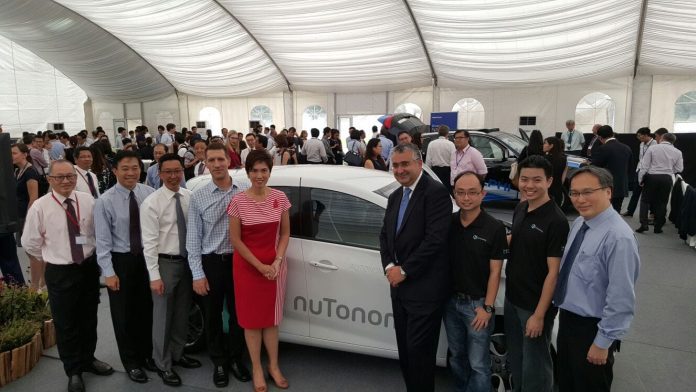Nutonomy has launched the world’s first public trial of self-driving taxis in Singapore, beating Uber to it.
Self-driving taxis powered by Nutonomy hit the streets of Singapore today, as the first autonomous driving taxi service trial in the world. The cars used in the trial are a Renault Zoe and Mitsubishi i-MiEV electric vehicle specially configured for autonomous driving by Nutonomy.
Nutonomy’s self-driving taxi trial is taking place in Singapore’s one-north business district, where the company has been conducting daily autonomous vehicle (AV) testing since April. The trial will enable Nutonomy to gather data on software system performance, vehicle routing efficiency, the vehicle booking process, and the overall passenger experience. The data will be used to refine Nutonomy’s self-driving software ahead of the launch of a widely-available commercial robo-taxi service in Singapore in 2018.
“Nutonomy’s first-in-the-world public trial is a direct reflection of the level of maturity that we have achieved with our AV software system. The trial represents an extraordinary opportunity to collect feedback from riders in a real-world setting, and this feedback will give Nutonomy a unique advantage as we work toward deployment of a self-driving vehicle fleet in 2018,” said Nutonomy’s CEO and co-founder Karl Iagnemma.
Uber announced last week the car-hailing service provider was planning to let customers summon self-driving Volvo XC90s in Pittsburgh later this month. Self-driving software company NuTonomy’s so-called “robo-taxi” beat Uber to it. In addition to testing self-driving taxis in Singapore, Nutonomy is also operating self-driving cars in Michigan and the United Kingdom, in collaboration with large automotive manufacturers including as Jaguar Land Rover.
Singapore residents can now book a ride in a Nutonomy self-driving car at no cost, using the car hailing service application. Just as an Uber employee will be riding the upcoming autonomous Uber cars in Pittsburgh, a Nutonomy engineer will be riding the autonomous vehicle to monitor how the system is performing and take control of the vehicle if needed. The self-driving taxis trial is the first result of Nutonomy’s partnership with the Singapore Land Transport Authority (LTA). The partnership was signed at the beginning of August with the aim of supporting the development of a commercial AV service in Singapore.
IIoT News Recap: Chronicled launches blockchain-based open registry for the IoT; Louisville opens smart home, smart city hub; Omron Launches new faster image sensing unit for IoT; Today’s forecast: IoT Technology spend

IoT security: Chronicled launches blockchain-based open registry for the IoT
Technology company Chronicled has launched an open registry for IoT, which stores the identity of physical items using the Ethereum blockchain,with the aim of improving interoperability in the consumer IoT space. The project is open sourced under the Apache License. “Chip companies, physical IP creators, and brands can now register and verify their BLE and NFC chips on a public blockchain,” said Chronicled CEO Ryan Orr. “These tamperproof chips can be ordered today and are already being deployed in consumer goods.” To date, Chronicled has deployed approximately 10,000 tamperproof NFC & BLE chips.
Smart city: Louisville opens smart home, smart city hub
Louisville’s mayor Greg Fischer announced the opening of LouieLab, a civic innovation hub based on a public-private partnership. LouieLab will provide a space where city employees, civic hackers and innovators can meet to discuss, collaborate and build solutions to challenges in Louisville. The space will also house the CNET Urban Smart Home, an initiative aimed at exploring smart home technology. “Louisville is leading the trend of Smart Cities — communities that are embracing technology and data to better the quality of life of their citizens. LouieLab brings those goals to life, giving government and citizen civic hackers a place to build off each other’s ideas to create truly innovative and effective solutions for our city,” said Ted Smith, Louisville’s chief innovation officer. LouieLab and the CNET Urban Smart Home are expected to launch in September.
Automation: Omron Launches new faster image sensing unit for IoT
Japan-based automation specialist Omron is launching “Human Vision Components” (HVC), a built-in human condition image-sensing unit that can recognize human face expression, gender, age, gaze and blink into a camera module with a maximum recognition speed ten times greater than that of previous models. Possible applications include measuring people’s attention to advertisements on digital signage, keeping track of people buying from vending machines or safeguarding people in manufacturing workplaces. “By embedding the company’s proprietary image-sensing technology capable of recognizing human conditions, now available in the form of the HVC-P2, in every piece of equipment and machinery, contributes to the realization of an IoT society where things work for people,” Omron said.
Today’s forecast: IoT Technology spend to reach $253 billion by 2021
Management consulting firm Zinnov expects IoT Technology spend to grow 16 percent and reach $253 Billion by 2021, up from $120 billion this year. North America will contribute 40 percent of the total spend. In terms of verticals, Industrial, BFSI and Automotive are expected to be the biggest spenders, contributing to more than 46 percent of the overall IoT Technology spend.

